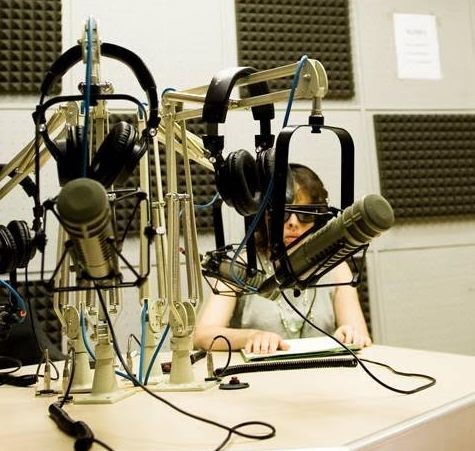Speeches Shim

January 2017—American public radio has had its famous and beloved talk show hosts Diane Rehm and Kojo Nnamdi. Albania has their equal—Ervehe Tushe, better known as “Veko,” who writes, produces and broadcasts the interviews and life stories of Albanians, gives her listeners the daily news, and catches their interest and imagination with features, announcements and reviews of events.
Tushe also happens to be blind—a result of a childhood accident.
After graduating from college, Tushe was uncertain about her life and what to do next when, in 2012, she attended specialized coaching for job seekers with disabilities. She became one of the 482 people who have benefited from this USAID-supported program implemented by the Albanian Disability Rights Foundation (ADRF).
“The coaching gave me confidence,” she said. After sending in her resume and sample voice recording, Tushe, accompanied by ADRF staff, interviewed at one of Tirana’s biggest radio stations. She was hired on the spot for whatever she could do. That turned out to be a lot.
“I sometimes wonder how I did it,” she said.
Her background provides some clues. Abandoned as a child, Tushe found herself in a loving foster family, learning through audio-books, and recognizing that she could remain sheltered and dependent or take the extra difficult road to independence. Her iron will has also helped her accomplish her successes.
Her next step, she says, will be to own a radio station.
Tushe is becoming a leading activist and voice for others, and is one of 20 women with disabilities in Albania to be part of an in-country leadership training program that stemmed from a 2015 Women’s Institute on Leadership and Disability Training-of-Trainers Program, supported by USAID and Mobility International USA.
With a population of nearly 140,000 citizens with disabilities, Albania requires that 4 percent of all jobs be filled by people with disabilities, a requirement under the 1995 employment promotion law that has not yet been met.
USAID stands behind ADRF as it influences new and improved legislation on behalf of people with disabilities, and supports legal reform of vocational training to meet the best international guidelines and practices. ADRF also conducted and published the first assessment of Albania’s employment policies and laws in 2010, and has measured their enforcement ever since.
ADRF’s close collaboration with the National Employment Service and its regional labor offices has been key to the success and sustainability of the USAID program’s efforts to match job seekers with receptive businesses. There are promising signs that the partnership will help mainstream the program.
In April 2014, for the first time, the Government of Albania released a special fund that supports businesses by subsidizing employee minimum salaries and social security as well as providing reasonable accommodation (adapting the work environment and offering accessible transport) for people with disabilities. To date, 24 businesses have accessed this special fund.
“Providing employment service to job-seeking persons with disability is a complex issue, but jointly we are changing and improving,” says Brikena Nallbani from the National Employment Service.
USAID’s Economic Empowerment of People with Disabilities project runs from September 2010 to May 2017.
LINKS

Comment
Make a general inquiry or suggest an improvement.